
Palestine, officially the State of Palestine, is a country in the Southern Levant region of West Asia. Founded on 15 November 1988 and officially governed by the Palestine Liberation Organization (PLO), it claims the West Bank and the Gaza Strip as its territory, all of which have been Israeli-occupied territories since the 1967 Six-Day War. The West Bank contains 165 Palestinian enclaves that are under partial Palestinian rule, but the remainder, including 200 Israeli settlements, is under full Israeli control. The Gaza Strip was governed by Egypt but conquered by Israel in 1967. Israel governed the region until it withdrew in 2005. The United Nations, the International Committee of the Red Cross, and various human-rights organizations still consider Gaza to be held under Israeli military occupation, due to what they regard as Israel's effective military control over the territory; Israel disputes this. Hamas seized power after winning the 2006 Palestinian legislative election. This has since been ensued by a blockade of the Gaza Strip by Israel and Egypt.

Amira Hass is an Israeli journalist and author, mostly known for her columns in the daily newspaper Haaretz covering Palestinian affairs in Gaza and the West Bank, where she has lived for almost thirty years.

The Gaza Strip smuggling tunnels are smuggling tunnels that had been dug under the Philadelphi Route along the Egypt–Gaza border. They were dug to subvert the blockade of the Gaza Strip to smuggle in fuel, food, weapons and other goods into the Gaza Strip. After the Egypt–Israel peace treaty of 1979, the town of Rafah, in the southern Gaza Strip, was split by this buffer zone. One part is located in the southern part of Gaza, and the smaller part of the town is in Egypt. After Israel withdrew from Gaza in 2005, the Philadelphi Corridor was placed under the control of the Palestine Authority until 2007, when Hamas seized power in 2007, and Egypt and Israel closed borders with the Gaza Strip.
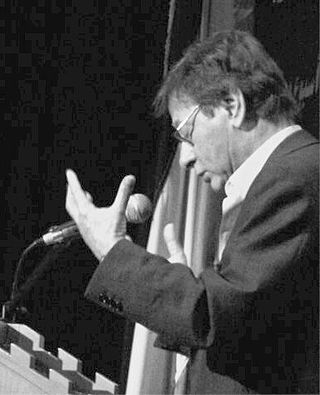
Mahmoud Darwish was a Palestinian poet and author who was regarded as Palestine's national poet.

Ahdaf Soueif is an Egyptian novelist and political and cultural commentator.
Queers Undermining Israeli Terrorism (QUIT!) is a gay San Francisco Bay Area political action group supporting boycott, divestment and sanctions against Israel; and opposing Pinkwashing of the ethnic cleansing of the Palestinian people. It was founded in early 2001 by a member of LAGAI-Queer Insurrection.

The state of human rights in the West Bank and Gaza Strip is determined by Palestinian as well as Israeli policies, which affect Palestinians in the occupied Palestinian territories both directly and indirectly, through their influence over the Palestinian Authority (PA). Based on The Economist Democracy Index this state is classified as an authoritarian regime.

Palestinian literature refers to the Arabic language novels, short stories and poems produced by Palestinians. Forming part of the broader genre of Arabic literature, contemporary Palestinian literature is often characterized by its heightened sense of irony and the exploration of existential themes and issues of identity. References to the subjects of resistance to occupation, exile, loss, and love and longing for homeland are also common.
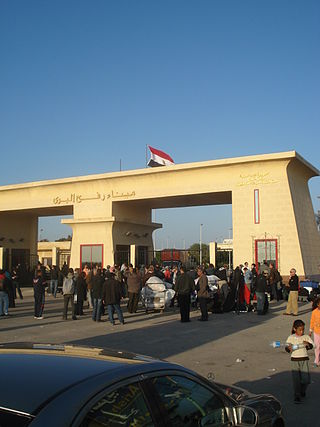
On 23 January 2008, Hamas militants in the Gaza Strip set off an explosion near the Rafah border crossing, destroying part of the 2003 wall. The United Nations estimates that as many as half the 1.5 million population of the Gaza Strip crossed the border into Egypt seeking food and supplies. Due to fears that militants would acquire weapons in Egypt, Israeli police went on increased alert.

The following outline is provided as an overview of and topical guide to the State of Palestine:

Silwan or Siloam is a predominantly Palestinian district in East Jerusalem, on the southeastern outskirts of the current Old City of Jerusalem.

Pakistan–Palestine relations refer to the bilateral relations between Islamic Republic of Pakistan and State of Palestine. The Palestinian Authority established an embassy in Islamabad on 31 January 2017. Pakistan remains a staunch supporter of the proposal for the creation of an independent Palestinian state, and in line with its pro-Palestinian doctrine, does not recognize the State of Israel. However, the former President of Pakistan, Pervez Musharraf, stated that Pakistan will recognize Israel's sovereignty if the latter withdraws its forces from the Israeli-occupied territories and allows an independent Palestinian state to be established within the Green Line that served as the international border between Israel and the Palestinian territories from the First Arab–Israeli War of 1948 to the Third Arab–Israeli War of 1967. Pakistan frequently provides various forms of humanitarian aid to the Palestinian Authority.
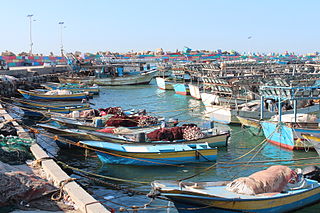
The Port of Gaza is a small port near the Rimal district of Gaza City. It is the home port of Palestinian fishing-boats and the base of the Palestinian Naval Police, a branch of the Palestinian National Security Forces. Under the Oslo II Accord, the activities of the Palestinian Naval Police are restricted to 6 nautical miles from the coast. Since 2007, the Port of Gaza has been under an Israeli-imposed naval blockade as part of a blockade of the Gaza Strip, and activities at the port have been restricted to small-scale fishing.

Al-Quds Arab Capital of Culture was the name given to Arab Capital of Culture programme in 2009. The programme, organised by UNESCO and the Arab League, is designed to promote Arab culture and encourage cooperation in the Arab world. The 2009 event was the 14th programme since its establishment in 1996.
Events in the year 2008 in the Palestinian territories.

Palestine–South Africa relations refer to the interstate relations between the Republic of South Africa and the State of Palestine.
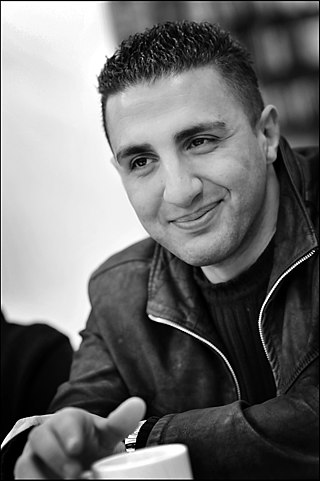
Najwan Darwish ; born December 8, 1978, in Jerusalem, is a Palestinian poet. The New York Review of Books has described him as "one of the foremost Arabic-language poets of his generation".
Events in the year 2020 in State of Palestine.
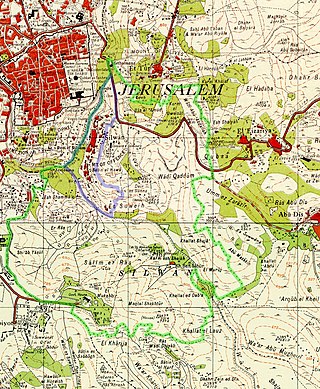
Wadi Hilweh is a neighborhood in the Palestinian Arab village of Silwan, intertwined with an Israeli settlement called the City of David. The Silwan area of East Jerusalem was annexed by Israel following the 1967 Six-Day War and 1980 Jerusalem Law, an action not recognized internationally. The international community regards Israeli settlements as illegal under international law, although Israel disputes this.















